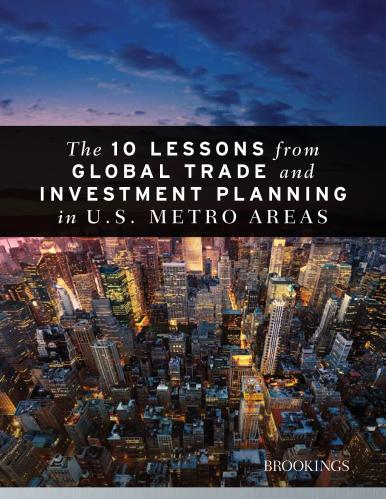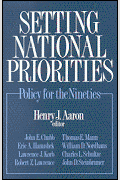It is seemingly easy to make the case for why metro areas should dedicate resources to attracting foreign direct investment (FDI). Foreign-owned firms pay 20 percent higher wages, on average, than their domestic peers. They also invest more in R&D, representing just 5 percent of employment but 19 percent of corporate R&D spending. But these and other oft-cited benefits of FDI typically have more to do with the strength of multinational corporate firms and the concentration of FDI in high-wage, high-skill advanced industries than with the foreignness of the firm.
This raises an important question for metro areas: Does foreign investment, which requires considerable time, expertise, and resources to attract, present any inherent advantage over otherwise identical domestic investment? Based on our work with 12 metro areas creating FDI strategies as part of the Global Cities Initiative, there are several reasons to believe that the answer is yes.
One reason is that mergers and acquisitions (M&A) by foreign firms, which account for the vast majority of FDI, generate better outcomes than M&A by other U.S. firms. Domestic M&A is frequently motivated by a desire to minimize competition by closing down a rival firm. Foreign companies, however, often pursue M&A specifically because they want to establish a foothold from which to expand in the United States by investing in existing characteristics of the target firm that are difficult or impossible to separate from the local market—including customer and supplier relationships, export channels, skilled workforce, and technology. As one point of evidence, research shows that foreign M&A tends to lead to increased R&D investment in the acquired firm, whereas domestic M&A results in less R&D spending. Further, because the foreign parent firm is often unfamiliar with the U.S. market, they tend to leave the local firm to operate autonomously—but with the benefit of a major cash infusion.
In addition, FDI can send a dual market signal about the attractiveness of a metro area. Foreign and domestic investment alike can raise a region’s profile among firms within an industry. But FDI is distinct in that it also serves to make a region more attractive to other firms from the country of the investor, regardless of industry affiliation. An investment by a German auto company, for instance, can help a region solidify its auto cluster (with the added advantage that foreign investors are more likely to bring a network of suppliers). But that investment can also catalyze investment from other German firms that simply value the concentration of German companies, expats, and related cultural and business institutions. This dynamic reinforces trade and investment relationships between two places.
Lastly, FDI brings export advantages that domestic investments do not. Like the other benefits of FDI described earlier, the higher export intensity of foreign-owned firms stems from the fact that foreign-owned firms are, by definition, multinational. But in many cases, FDI is undertaken with the specific goal of creating an “export platform,” in which the U.S. establishment will export into neighboring countries (particularly within areas under a free trade agreement such as NAFTA). In addition, U.S. firms acquired by a foreign owner gain access to new markets through the parent firm’s global export channels.
It is important that economic development leaders understand the innate advantages of attracting a foreign-owned firm versus an otherwise-identical domestic firm because economic development organizations (EDOs) are under constant pressure to justify their international activities. The reality, however, is that regardless of these nuanced differences, the scale of FDI alone will eventually force every metro area EDO to respond. Already, Midwestern metro areas like Columbus and Milwaukee, traditionally less globally connected than major coastal cities, report that a third to half of their potential investment pipeline is foreign.
The Brookings Institution is committed to quality, independence, and impact.
We are supported by a diverse array of funders. In line with our values and policies, each Brookings publication represents the sole views of its author(s).











Commentary
Does the ‘foreign’ in ‘foreign direct investment’ matter?
January 14, 2016